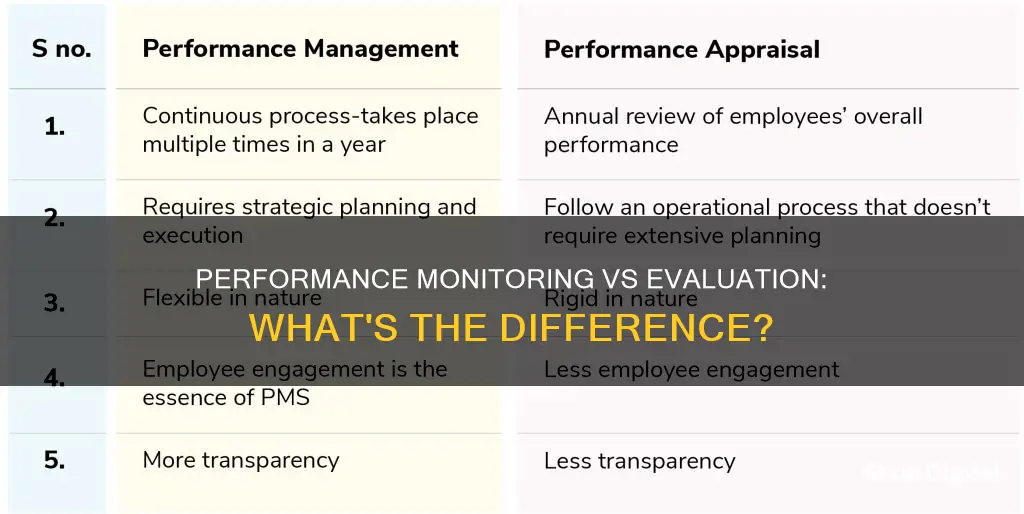
Monitoring and evaluation are two management tools that help organisations improve their performance and keep control of their activities. While they are often used interchangeably, monitoring and evaluation have distinct meanings and functions. Monitoring is the process of gathering data about a program or project to track its progress and performance. This involves collecting, monitoring, and tracking data and key performance indicators. On the other hand, evaluation is a scientific process that assesses the effectiveness, efficiency, and success of a program or project by comparing the actual outcomes with the desired outcomes. While monitoring is a continuous activity, evaluation is typically conducted at specific milestones or after the completion of a project. Monitoring focuses on the operational aspects, such as timelines and budgets, while evaluation examines broader aspects, including the relevance, sustainability, and impact of the project.
| Characteristics | Values |
|---|---|
| Nature | Monitoring is observational; Evaluation is judgmental |
| Frequency | Monitoring is continuous; Evaluation is periodic |
| Level | Monitoring is operational; Evaluation is business |
| Performed by | Monitoring is performed by supervisors; Evaluation is performed by managers or external evaluators |
| Focus | Monitoring focuses on efficiency; Evaluation focuses on effectiveness |
| Scope | Monitoring is short-term; Evaluation is long-term |
| Timing | Monitoring is performed during the project; Evaluation is performed after the project |
| Data | Monitoring uses quantitative data; Evaluation uses a combination of quantitative and qualitative data |
| Purpose | Monitoring is about tracking progress; Evaluation is about assessing outcomes |
What You'll Learn

Monitoring is continuous, evaluation is periodic
Monitoring and evaluation are two management tools that help organisations improve their performance and keep control of their activities. While they are closely related, there are significant differences between the two.
Monitoring is a continuous, routine activity that is performed at the operational level of management. It involves the systematic collection and analysis of data to track the progress and implementation of a project. This data can be qualitative or quantitative and is used to help achieve the objectives of a project. Monitoring focuses on improving the overall efficiency of a project by removing bottlenecks and ensuring that activities are carried out according to plan and within established standards. It is performed by supervisors or people directly involved in the project's implementation and provides ongoing feedback for decision-making and course correction.
On the other hand, evaluation is a periodic activity performed at the business level. It is a scientific, judgemental process that assesses the success of a project in meeting its objectives. Evaluation is usually conducted by managers or independent external parties and focuses on improving the effectiveness of a project by comparing it to established standards. It is a long-term process that assesses the outcomes and impact of a project and provides a comprehensive understanding of its achievements and effectiveness. Evaluation is typically conducted at specific milestones or after the completion of a project and involves rigorous data collection, analysis, and interpretation to draw valid and reliable conclusions.
Guide to Buying Affordable Monitors: Quality on a Budget
You may want to see also

Monitoring is operational, evaluation is strategic
Monitoring and evaluation are two management tools that help organisations improve their performance and keep control of their activities. While they are closely related, there are some key differences between the two.
Monitoring is an operational activity, performed at the functional level of management. It is a routine, short-term, continuous process that involves the systematic collection and analysis of data to track the progress and implementation of a project. Monitoring is observational in nature and focuses on improving the overall efficiency of the project by identifying and addressing issues or bottlenecks during the process. It is carried out by supervisors or project staff who are directly involved in the project's implementation and focuses on the day-to-day management and oversight of project activities. The data collected through monitoring is predominantly used for management and project improvement purposes, ensuring that activities are on track and aligned with objectives.
On the other hand, evaluation is strategic and performed at the business level by managers or external evaluators. It is a sporadic, long-term activity that involves the scientific and systematic assessment of a project's performance, effectiveness, and sustainability. Evaluation is judgmental in nature and focuses on improving the overall effectiveness of the project by making comparisons with established standards. Evaluation is used to support strategic planning and inform future decision-making, program design, and resource allocation. It provides a comprehensive understanding of the project's achievements, effectiveness, and lessons learned, and its findings are used for accountability, learning, and decision-making.
In summary, the main difference between monitoring and evaluation is that monitoring is operational and focused on the day-to-day management of a project, while evaluation is strategic and focused on assessing the overall impact and effectiveness of a project to inform future decisions.
Is Your iPad Being Monitored? Here's How to Find Out
You may want to see also

Monitoring is short-term, evaluation is long-term
Monitoring and evaluation are two management tools that help organisations improve performance and keep control of their activities. While they are both important for assessing the outcomes of a project, they differ in the way they collect information and draw conclusions.
Monitoring is a short-term process that focuses on the collection of information regarding the success of a project. It is a routine, observational, and operational-level activity, performed by supervisors or those directly involved in the project's implementation. Monitoring is concerned with the day-to-day management and oversight of project activities, ensuring that things are being delivered on time and within budget. It identifies bottlenecks and deviations from the project plan, providing continuous feedback for decision-making and course correction. The data collected through monitoring can be qualitative or quantitative and may include progress reports, beneficiary reports, and performance reports.
On the other hand, evaluation is a long-term process that not only records information but also assesses the outcomes and impact of the project. It is a periodical, judgmental, and business-level activity, often performed by managers or independent external evaluators. Evaluation focuses on future events and long-term planning, assessing the effectiveness, efficiency, relevance, and sustainability of a project. It involves rigorous data collection, analysis, and interpretation to draw valid and reliable conclusions. Evaluation provides a comprehensive understanding of the project's achievements and effectiveness, informing strategic decisions, policy formulation, and resource allocation.
In summary, monitoring and evaluation play complementary roles in project management. Monitoring provides real-time information and identifies issues during the project's implementation, while evaluation assesses the overall outcomes and impact of the project, supporting long-term planning and strategic decision-making.
Stretching Your CS Res ASUS Monitor: Tips and Tricks
You may want to see also

Monitoring is observational, evaluation is judgemental
Monitoring and evaluation are two distinct management tools that are crucial for assessing and improving the performance of an organisation's activities. While they are often used interchangeably, monitoring and evaluation differ in their approach, nature, scope, and timing. One key distinction between the two is that monitoring is observational, whereas evaluation is judgemental.
Monitoring is the systematic process of observing and recording the activities carried out in a project. It involves gathering data, monitoring progress, and tracking key performance indicators. This data can be qualitative or quantitative and is collected through various tools such as progress reports, beneficiary reports, and performance reports. Monitoring is typically conducted by supervisors or people directly involved in the project's implementation and focuses on improving the overall efficiency of the project. It identifies bottlenecks and deviations from the plan, ensuring that activities are in line with the organisation's objectives. Monitoring provides ongoing feedback and information for decision-making and course correction during the project's implementation.
On the other hand, evaluation is a judgemental process that involves passing value judgments concerning the performance level or attainment of defined objectives. It is a scientific, rigorous analysis of a continuing or completed project to determine its significance, effectiveness, impact, and sustainability. Evaluation is often conducted by managers or independent external evaluators and focuses on improving the effectiveness of the project. It involves comparing the results against set standards and objectives, assessing whether the project was successful in achieving its intended outcomes. Evaluation provides a comprehensive understanding of the project's achievements, effectiveness, and lessons learned, which can inform future decision-making, program design, and resource allocation.
While monitoring is a routine, short-term process concerned with data collection, evaluation is a sporadic, long-term activity that goes beyond data collection to assess and interpret outcomes and impacts. Monitoring focuses on the operational aspects of a project, such as resource utilisation, timelines, and quality standards, while evaluation examines broader aspects, including relevance, sustainability, and impact. Monitoring is performed at the functional level of management and provides continuous feedback for decision-making during the project's implementation. In contrast, evaluation is conducted at the business level and provides a comprehensive assessment of the project's outcomes, impact, and value after its completion.
In summary, monitoring is observational, focusing on the collection of data and ensuring the project is on track, while evaluation is judgemental, assessing the project's achievements, effectiveness, and impact in relation to its defined objectives. Both processes are essential for effective project management, providing valuable insights and supporting informed decision-making.
Best Places to Buy Print Editions of the Christian Science Monitor
You may want to see also

Monitoring is internal, evaluation is external
Monitoring and evaluation are two management tools that help organisations improve their performance and keep control of their activities. They are both critical for an organisation to monitor the progress of its projects. However, they differ in the way they collect information and draw conclusions.
Monitoring is the process of collecting data about a program or project. This can include qualitative or quantitative data, which is collected through monitoring tools such as progress reports, beneficiary reports, project reports, and performance reports. Monitoring is often conducted by people directly involved in the implementation process and can be internal or external. It is a routine, short-term, and operational-level activity that focuses on improving the overall efficiency of the project by removing bottlenecks. It is concerned with the collection of information regarding the success of the project and whether activities are in line with the objectives of the enterprise. Monitoring is also used to ensure that things are being delivered on time and within budget, with the priority being on assessing whether things are being done right.
On the other hand, evaluation is external. It is a scientific, objective, and rigorous process that gauges the success of the project or program in meeting its objectives. Evaluation is conducted by independent evaluators or evaluation teams with expertise in evaluation methodologies. It is a sporadic, long-term, and business-level activity that focuses on improving the effectiveness of the project by making comparisons with established standards. Evaluation is concerned with the overall assessment and accountability of the program or project and whether the organisation is doing the right things. It is also used to inform future decision-making, program design, and resource allocation.
Simple Ways to Check if Your Monitor Has Full RGB
You may want to see also
Frequently asked questions
Monitoring and evaluation are both management tools to help keep control of business activities and raise performance levels. However, they have distinct differences:
Monitoring is the process of gathering data and information about a project or program. This is done to:
- Track progress and performance.
- Identify issues and potential problems.
- Ensure accountability.
- Maintain quality assurance.
- Improve performance.
Evaluation is a scientific and systematic process to:
- Assess the effectiveness, efficiency, impact, and sustainability of a project or program.
- Measure the success of a project in meeting its objectives.
- Provide evidence-based insights for decision-making.
- Inform future planning and resource allocation.
Monitoring is a continuous, routine activity, performed at the operational level by supervisors. It focuses on the collection of data and information to track a project's progress. Evaluation, on the other hand, is a periodic activity, performed at the business level by managers or external evaluators. It involves analysing and interpreting data to assess the overall impact and effectiveness of a project, usually through a before-and-after comparison.







